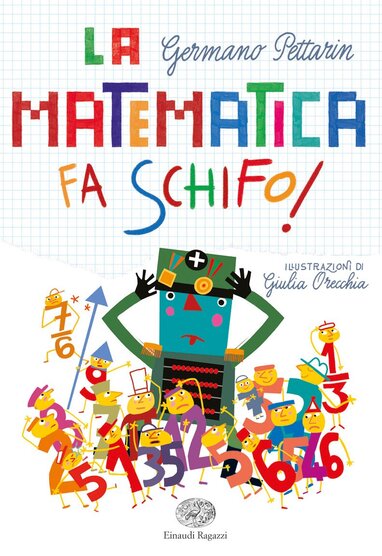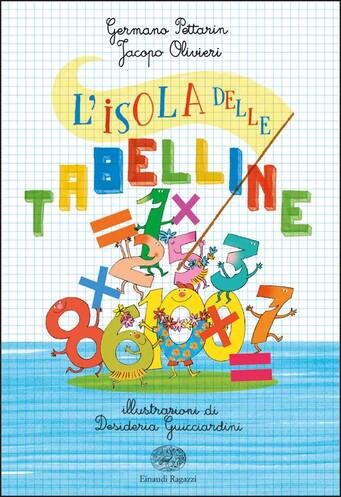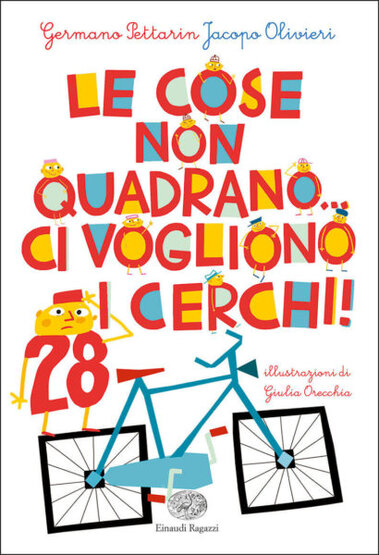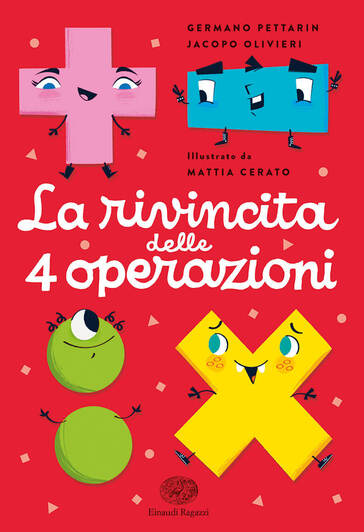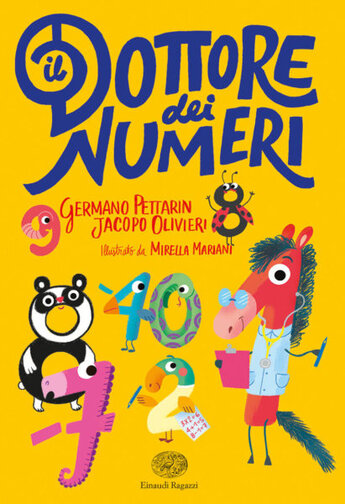The goal of this blog post is to introduce you to a new series of mathematical stories in Italian language by Germano Pettarin who teaches mathematics at a public high school and at the University of Venice and Padua in Italy. While many of us might not be fortunate enough to be able to read and understand Italian, it can still be interesting to learn about the world of mathematical stories outside the English-speaking world.
Can you imagine a city, an island, a world where numbers live together and mathematical operations become stories?
This is the basic idea of a new series of mathematical stories in Italian language by Germano Pettarin, an Italian professor of mathematics and computer science (and Jacopo Olivieri, his co-author). The books are published by Einaudi Ragazzi publishing house.
The idea of books that propose mathematics as a story, using numbers as characters who talk, interact with each other, get angry, etc., is a novelty in the field of books with educational purposes for children here in Italy. Often the numbers are just elements of the stories, not the protagonists.
In these stories, numbers, operations, geometric figures come to life, and the rules of mathematics and geometry become the pretext for inventing places (e.g., the Pacifric Ocean, the Cifradi Archipelago), characters (e.g., the general Abacone or the unpredictable Pi Greek), or paradoxical situation (e.g., world without zeros and without circles). In a word, to tell stories where numbers and polygons all play together, argue, argue always following the rules of mathematics in a fun and playful way. Each with its own characteristics: One wants to be the leader, Three the perfect number, Zero unable to follow the rules: it does not divide, does not increase the result of the sums, etc.
Indeed, in his most recent story: numbers get sick, a pandemic between numbers, solved by a prodigious mathematical vaccine.
They are all stories that try to talk about maths to children and teenagers in fun and enjoyable way.
Inspirations for writing mathematical stories
The idea of writing illustrated books on the intricate world of mathematics stems from the proposal of the publisher who, by the way, has always had a disgust towards mathematics. We would like to overcome the distrust that is found towards mathematics with books for children who have not taken the blows that lead to hatred of mathematics.
The publisher asked for books that explained the more particular concepts of mathematics to attract interest in this subject, in a colloquial and fun way. Children's books are good because you can express concepts, even difficult ones, in a simple way: the examples and images with which they are presented are effective not only for the little ones, but also for adults.
All treated in a non-notional way. Mathematics is a difficult subject for many, useless to go around it, with its round and square brackets, square roots and commas in the most unlikely places, elevations to surprising powers. It's hard to believe how you can have fun talking about it and even studying it. Especially if it is proposed in a rigid and repetitive way. In these novels it is approached from another point of view: mathematics as fun, discovery.
About the series
This is the basic idea of a new series of mathematical stories in Italian language by Germano Pettarin, an Italian professor of mathematics and computer science (and Jacopo Olivieri, his co-author). The books are published by Einaudi Ragazzi publishing house.
The idea of books that propose mathematics as a story, using numbers as characters who talk, interact with each other, get angry, etc., is a novelty in the field of books with educational purposes for children here in Italy. Often the numbers are just elements of the stories, not the protagonists.
In these stories, numbers, operations, geometric figures come to life, and the rules of mathematics and geometry become the pretext for inventing places (e.g., the Pacifric Ocean, the Cifradi Archipelago), characters (e.g., the general Abacone or the unpredictable Pi Greek), or paradoxical situation (e.g., world without zeros and without circles). In a word, to tell stories where numbers and polygons all play together, argue, argue always following the rules of mathematics in a fun and playful way. Each with its own characteristics: One wants to be the leader, Three the perfect number, Zero unable to follow the rules: it does not divide, does not increase the result of the sums, etc.
Indeed, in his most recent story: numbers get sick, a pandemic between numbers, solved by a prodigious mathematical vaccine.
They are all stories that try to talk about maths to children and teenagers in fun and enjoyable way.
Inspirations for writing mathematical stories
The idea of writing illustrated books on the intricate world of mathematics stems from the proposal of the publisher who, by the way, has always had a disgust towards mathematics. We would like to overcome the distrust that is found towards mathematics with books for children who have not taken the blows that lead to hatred of mathematics.
The publisher asked for books that explained the more particular concepts of mathematics to attract interest in this subject, in a colloquial and fun way. Children's books are good because you can express concepts, even difficult ones, in a simple way: the examples and images with which they are presented are effective not only for the little ones, but also for adults.
All treated in a non-notional way. Mathematics is a difficult subject for many, useless to go around it, with its round and square brackets, square roots and commas in the most unlikely places, elevations to surprising powers. It's hard to believe how you can have fun talking about it and even studying it. Especially if it is proposed in a rigid and repetitive way. In these novels it is approached from another point of view: mathematics as fun, discovery.
About the series
La matematica fa schifo! (Math sucks!) - 2017
In the imaginary world of Cifralia, to fix the disorder created by the government of King Chaos, a leader is finally proclaimed: Generalissimo Abacone, a rigid, precise, fanatic of the rules.
I'm the right one in the right place - He thought - who better than me can govern the world of mathematics, governed by strict, formal rules where there is no room for fantasy and imagination but only repetitive and boring calculations. Here it takes rigor, rigor and rigor!
But things will not be like this.
Other than docile to follow the rules: numbers do not behave like in math books, they do not allow themselves to be submitted to mechanical and monotonous exercises.
The numbers all live together, they talk to each other, they face everyday problems, each with its own character, sometimes creating crazy messes.
And Abacone, despite himself, will discover that even in the world of numbers there are surprising results: sometimes paradoxical, apparently impossible but therefore fascinating. Mathematics is not just rigor.
In the imaginary world of Cifralia, to fix the disorder created by the government of King Chaos, a leader is finally proclaimed: Generalissimo Abacone, a rigid, precise, fanatic of the rules.
I'm the right one in the right place - He thought - who better than me can govern the world of mathematics, governed by strict, formal rules where there is no room for fantasy and imagination but only repetitive and boring calculations. Here it takes rigor, rigor and rigor!
But things will not be like this.
Other than docile to follow the rules: numbers do not behave like in math books, they do not allow themselves to be submitted to mechanical and monotonous exercises.
The numbers all live together, they talk to each other, they face everyday problems, each with its own character, sometimes creating crazy messes.
And Abacone, despite himself, will discover that even in the world of numbers there are surprising results: sometimes paradoxical, apparently impossible but therefore fascinating. Mathematics is not just rigor.
L’isola delle tabelline (The island of multiplication tables) - 2018
Why we are here? What is our purpose?
This is the question that torments the 99 numbers that inhabit the island of Tabellandia.
There are four numbers Twenty-four, two numbers Twenty-seven, only one Forty-nine. There is no Forty-seven, much less thirteen. It seems that they were placed there without a criterion, almost as if they were scrap numbers. While, in the other islands, everything is clear: on the island of even numbers there are even numbers, on the island of squares the numbers that are a square, on the island of Plus Hundred the large numbers, etc.
But perhaps the arrival of Cento would have clarified the enigma. With him they would become a hundred numbers. One hundred like the Greek name of the capital of Tabellandia, Hecaton. But why a hundred? And who is the mysterious character who arrived by plane with Cento? What is the huge table on top of the mountain for?
It's the mystery of the multiplication tables!
Le cose non quadrano… ci vogliono I cerchi! (Things don't add up ... circles are needed!) - 2019
Are all numbers equally important? And the polygons?
These seem like obvious questions: of course, yes. You can't do without a number or a polygon. There is no more beautiful number or polygon: each has its own characteristics, which make it special.
Instead in the world of Matematopia, where numbers and polygons live, in strictly separate neighborhoods, it seems that it is not so obvious.
There are numbers, there are polygons that feel better than others. And there are numbers and polygons that are badly tolerated, considered strange, ambiguous, different. Better not trust them, better keep them on the sidelines: who knows what they really think …
It would be better if they left. And they really go! And then yes, the problems come!
La rivincita delle 4 operazioni (The revenge of the 4 operations) - 2020
There is always a lot to do in Typotopia, the land of characters. New textbooks are continually arriving with the text beautiful and ready to be written in full, from the first capital letter to the last point.
The characters jump frantically along the lines, page after page, composing the necessary words. In the end, you have the complete book.
Most characters are ultra busy. Almost all of them: because there is Crocetta, a cross-shaped font, which is never used. In a text there are vowels, consonants, punctuation marks. Who ever writes a cross?
And his friends, Colon, Hyphen, and x also work very little, compared to the other characters.
Despised by the letters of the alphabet, the four friends find themselves wandering the world without a purpose. Until they discover that they are actually the most important signs of Mathematics!
Il dottore dei numeri (The doctor of numbers) - 2021
In Mondonumero, life flows happily in the village of Borgo Intero Piú. And it could not be otherwise: its inhabitants, the Positive Numbers, are always cheerful and optimistic types. At least until the day when a frightening contagion hits the village: an infestation of minus signs begins to transform everyone into Negative Numbers, sad and depressed. What happened? Is it possible that the mysterious evil has something to do with the visit of an envious irrational number, the expert in magical arts Pi Greco?
In a fight against time to save the village from rampant unhappiness, Doctor Uno tries to find a cure. But not even the faithful Zero and Piccolo Due (a small number who has never grown up) seem able to help him ... And if the solution were precisely the unknown powers of his two friends?
And more mathematical stories are coming!
Final words …
I hope that reading my mathematical stories will help overcome the fear of mathematics. It is not clear why, but at a certain point during their school career, more or less brilliant, boys and girls stumble into a huge and insurmountable fear. A fear that adults usually struggle to understand. Or for which they find themselves feeling enormous empathy since they have experienced it themselves in times gone by. The famous fear of mathematics. Very famous. And the teachers are not to be held responsible for so much terror. Unfortunately, mathematics is often the protagonist of terrible urban legends. Unfortunately, these are always accompanied by the feeling of “not succeeding”, a frustration that tends to increase.
But, math shouldn't be scary, on the contrary ... it can also be very fun and stimulating.
About the author
|
Germano Pettarin was born in Italy, where he teaches mathematics in the public high school in Pordenone (northeast Italy), and at the University of Venice and Padua. He is also a consultant and computer teacher at companies, public and private schools, training institutions and universities. He holds two degrees in specialized computer science and information science. He is the author of numerous manuals and popular publications in the field of mathematics and computer science and books on mathematical and computer games. His LinkedIn profile can be found here, and can be contacted via [email protected].
|
